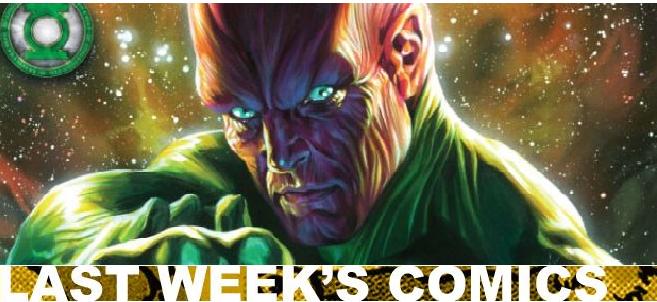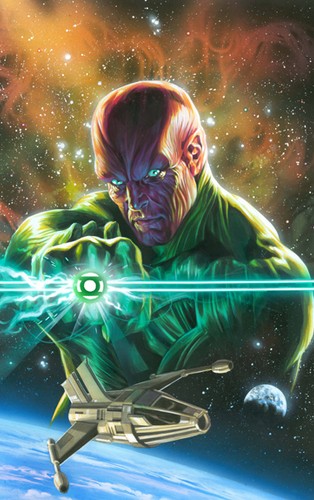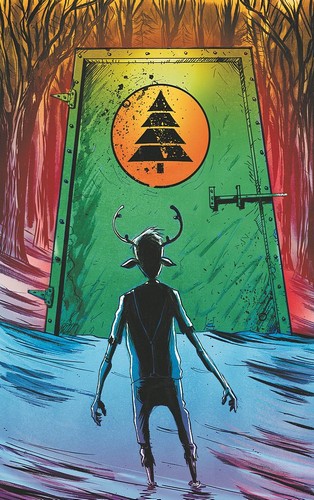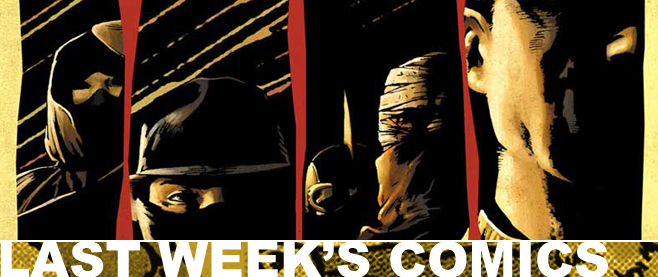
Last Week’s Comics 6/8/2011
[wpcol_1half id=”” class=”” style=””]
Flashpoint: Abin Sur, The Green Lantern (DC – writer: Adam Schlagman; art: Felipe Massafera)
Nice Green Lantern movie tie-in DC!
The art in this issue is all Green Lantern movie art—Mark Strong’s Sinestro, Temuero Morrison’s Abin Sur and even Michael Clark Duncan’s Kilowog. Even the Guardians look as they do in the movie. This reminds me of when Spider-Man 3 came out and Marvel found a way to put Spidey back in the black costume in order to drum up support for the movie. It’s cheap. And it shows that the maker is not so sure of his product.
Regardless of this, Abin Sur: The Green Lantern is a fantastic read.
Schlagman has the same tone that Geoff Johns does writing Green Lantern. Abin Sur’s thought boxes, much like Hal Jordan’s, introduce his name and his role. Surprisingly, he’s still the guardian of sector 2814, the sector Hal Jordan is supposed to guard. If this issue was not a Flashpoint tie-in, it could read as a prologue to the Green Lantern movie, yet Schlagman dips into Johns’ mythos, even referencing the lantern entities.
The connection to Flashpoint only appears on the last page (and it reminds me of Alan Moore’s “Tygers” story, where Abin Sur asks to hear about the prophecy of the Blackest Night). Luckily, this leaves twenty pages of plot and character development. Abin Sur is a different lantern than Jordan. He’s broken, hurt, and scarred. He’s not lighthearted like Hal, but he is serious about being a Green Lantern.
The dialogue can be a bit dramatic, almost to the point of silliness. And in an altered timeline, I don’t like how secondary and tertiary characters still have the same roles as they would in the regular timeline. I’m afraid, however, that Hal will still inherit the Green Lantern ring and that the theme of Flashpoint is that destiny is above anyone else.
Anyway, I enjoyed Abin Sur: The Green Lantern, and look forward to reading the rest of the series. For a What If? story, it’s intriguing. While Abin Sur makes a great Green Lantern, this only goes to show just how awesome of a character Hal Jordan is.

[/wpcol_1half] [wpcol_1half_end id=”” class=”” style=””]
Sweet Tooth #22 (Vertigo – writing and art: Jeff Lemire)
It’s been a while since I read Sweet Tooth. I’m pretty backlogged with the series, actually—probably about ten issues behind. But I wanted to read this issue anyway to see if, even though I had no idea what is going on, I would still care. I had been getting a bit frustrated with Sweet Tooth. The allure of the character was fading, and the story was losing its grip.
After this issue, I’m hooked again.
There’s a lot of conversation that takes place in this issue. About three quarters of the panels have dialogue in them. Normally, I’m bored by this. If a comic gets too wordy, it loses its flow, slows down, and becomes a cumbersome read. While the last thing I read by Jeff Lemire (Superboy) left me a bit underwhelmed, the dialogue in this issue kept me interested.
From what I can gather, Gus and Walter have been through a lot. Gus’ importance is more and more essential to the story that Lemire crafts, but I also feel less sure about Gus’ safety. With the danger present in this issue, I wouldn’t be surprised to see Gus die. He’s crucial to the story, but not as a necessary character. As an ideal? He represents everything good about the half-breeds.
What got me hooked on Sweet Tooth is Gus. His vulnerability, innocence, and naiveté make him engaging. And while this issue is less about Gus than Walter and the rest of the supporting characters, Gus’ interactions show him to be just as sweet as ever. And just as heartbreaking.
If you haven’t read Sweet Tooth, or like me, haven’t read Sweet Tooth in a while, I think you’ll enjoy the series. Gus is charming, Walter is damaged and the world is divided between those who have humanity and those who have lost it. It reminds me a lot of The Road. Walter and Gus present a great father/son dynamic, and Walter’s feelings for Gus—which at first were lukewarm—have become a centerpiece for the series.
Sweet Tooth is mostly character over plot, but the characters are brilliantly fleshed out and relatable in a lot of ways. That’s what makes Sweet Tooth such an interesting read. Where a lot of other series rely on action or plot over character development, Sweet Tooth uses its characters for everything else. And it works very well.

[/wpcol_1half_end]



